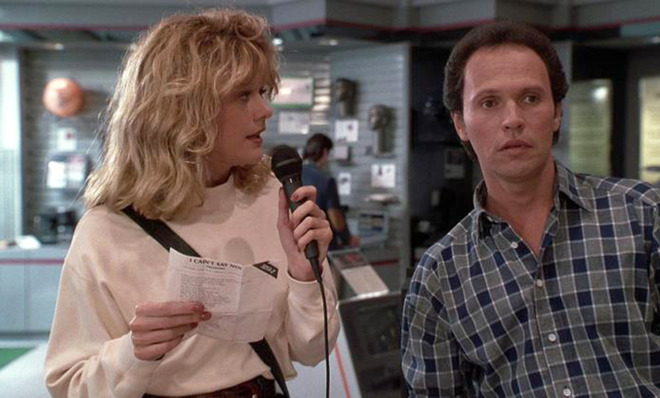Girls on Film: Forget When Harry Met Sally. Men and women can be friends.
Twenty-five years after its release, the beloved rom-com's guiding principle remains annoyingly pervasive in Hollywood


A free daily email with the biggest news stories of the day – and the best features from TheWeek.com
You are now subscribed
Your newsletter sign-up was successful
When Harry met Sally 25 years ago this week, America fell in love with Nora Ephron. Through her legendary rom-com triumvirate — When Harry Met Sally, Sleepless in Seattle, and You've Got Mail — Ephron set the blueprint for modern cinematic romance. Hollywood has since followed her formula — essentially boy meets girl, they spar, then fall in love — so loyally that even They Came Together, which purported to satirize the entire genre, is almost exclusively a satire of her work.
For years, the Ephron formula was one of Hollywood's biggest moneymakers, until superheroes and 3D took the spotlight. Now the rom-com has been relegated to the sidelines, prompting many to argue that the genre is essentially dead. And yet, one rom-com trope remains naggingly pervasive: the key argument on which all of When Harry Met Sally is based. In the words of Billy Crystal's Harry Burns: "Men and women can't be friends."
Wrong.
The Week
Escape your echo chamber. Get the facts behind the news, plus analysis from multiple perspectives.

Sign up for The Week's Free Newsletters
From our morning news briefing to a weekly Good News Newsletter, get the best of The Week delivered directly to your inbox.
From our morning news briefing to a weekly Good News Newsletter, get the best of The Week delivered directly to your inbox.
When Harry Met Sally was conceived as an exploration of sex. Director Rob Reiner wanted to make a movie about two people who become friends and try to avoid sex, only to end up having sex and ruining everything. Reiner, producing partner Andrew Scheinman, and Ephron got to work, sharing all of their gendered conceptions about life and sex, with Harry and Sally standing as de-facto versions of Reiner and Ephron themselves: the man who thought "the sex part always gets in the way," and the woman who disagreed with him.
"Both of us are right," Ephron once wrote, arguing that the film was really about "how different men and women are." Ephron said men "don't want to be friends with women," although women "are dying to be friends with men." So Meg Ryan's Sally swears men and women can be friends, Harry disagrees, and they part ways. It takes 10 years for them to finally try to be friends — and just as they get close, they finally have sex and everything falls apart.
Unfortunately, the other thing that fell apart in When Harry Met Sally's wake was Hollywood's treatment of male-female friendship. The film "set the potential for male-female friendship back about 25 years," said Michael Monsour in Psychology Today. "Almost every time you see a male-female friendship, it winds up turning into romance."
There are no shortage of representative examples in both film and television: Some Kind of Wonderful. 13 Going on 30. Friends. My Best Friend's Wedding. Friends with Benefits. No Strings Attached. Friends with Kids. Pretty in Pink. Cheers. Buffy the Vampire Slayer. Zack and Miri Make a Porno. Just Friends. Reality Bites. Sky High. One Day. Spider-Man. Keeping the Faith. (Feel free to add a few of your own.)
A free daily email with the biggest news stories of the day – and the best features from TheWeek.com
There are countless films about men and women failing to be just friends, or friendship being a mask for their deeper feelings. Some films embrace the idea; some use friendship as a way to bring lovers together; and some pretend to be doing something radical before heading back to safe tropes. (In Friends with Benefits, for example, Mila Kunis and Justin Timberlake are strangers who very briefly become "friends" before having "casual" sex — and, inevitably, falling for each other for real.)

This narrative often works — and creates engaging films — because exploring "friendship" requires two characters to genuinely and deeply interact with each other. Friendship is the cinematic antidote to romances that begin with flirtation and lust — as if a couple couldn't interact genuinely without beginning as friends. What many writers and filmmakers fail to consider is that many of these films wouldn't be at all hurt by removing the question altogether and just letting the events unfold.
As Psychology Today noted, there is a historical precedent for this trope. Psychologist Linda Sapadin explained: "The belief that men and women can't be friends comes from another era in which women were at home and men were in the workplace, and the only way they could get together was for romance. Now they work together and share sports interests and socialize together."
This world is no longer a nice, neat area where women are moms, men are breadwinners, and neither can relate to each other. (Not, of course, that it ever was the simple dichotomy suggested in media; even Donna Reed was a professional woman in real life.) Today, it's obvious that women are as diverse as men in the ways they work and play. We also live in a world that acknowledges diverse manifestations of sexuality, which destroys the idea that friendships between those of the same gender can avoid sexual turmoil as a matter of course. The more women and men are allowed to explore their interests and not align with rigid boundaries, the more they can connect in ways that aren't sexual.
But instead of exploring this wealth of potential — which could easily pull us out of many cinematic ruts — the romantic comedy fervently sticks to the When Harry Met Sally question, and in doing so, stigmatizes something very real.
By asking this question over and over in a genre that strives for the romantic happy ending, the common platonic friendship has been warped into a tragedy where romance is happiness, and friendship is sadness. During a recent Q&A for a film in which the friends become lovers, the crew actually said that it would have been tragic if the friends didn't end up together, even though their friendship was perfectly happy.

Meanwhile, male buddy comedies celebrate the very thing rom-coms fight against. Films like the Jump Street series, I Love You Man, and Superbad do precisely what hetero rom-coms say is "sad": relish in increasingly intimate, yet platonic, friendships. The habit speaks to the very nature of hetero-dominant Hollywood, in which friendships between hetero men and women are precursors to romance, but friendships between hetero men (or women) have no possibility of leading to romance.
What can be done to combat this trend? Kevin Smokler, author of the upcoming book Brat Pack America, has created a Bechdel Test-esque corollary, The Smokler Amendment, as a response. To pass, the film must contain "heterosexual male and female characters who are friends, not 'off the market,' remain friends, and do not hook up."
Like the Bechdel Test, the amendment is quite simple and quite difficult to pass. Many that do squeak by do so problematically. One person submitted the Harry Potter series, because Harry and Hermione are friends who never hook up and are usually single. But it only passes because Hermione chose the other guy in their trio. They don't end up together because she chooses Ron instead — and even then, J.K. Rowling regrets not pairing her with Harry.
So time marches on, cinema continues to ignore male/female friendships, and When Harry Met Sally is invoked over and over in this ongoing question that was answered a long time ago.
Friendship is not beholden to any one structure. There will be men who struggle to be platonic with their female friends (and thus assume every other man on earth is like them). There will be friends who used to be lovers, and lovers who used to be friends. There will be women and men who could never even think of the possibility of having sex with their friends, and those who can. In other words: there are plenty of relationships Hollywood could explore without making Billy Crystal's 25-year-old speech the first commandment of modern friendship.
Until then, I'll continue to watch rom-coms about friendship with bated breath, waiting for the day that two friends kiss each other, hate it, and realize they were better as friends all along.
Girls on Film is a weekly column focusing on women and cinema. It can be found at TheWeek.com every Friday morning. And be sure to follow the Girls on Film Twitter feed for additional femme-con.
Monika Bartyzel is a freelance writer and creator of Girls on Film, a weekly look at femme-centric film news and concerns, now appearing at TheWeek.com. Her work has been published on sites including The Atlantic, Movies.com, Moviefone, Collider, and the now-defunct Cinematical, where she was a lead writer and assignment editor.
-
 The EU’s war on fast fashion
The EU’s war on fast fashionIn the Spotlight Bloc launches investigation into Shein over sale of weapons and ‘childlike’ sex dolls, alongside efforts to tax e-commerce giants and combat textile waste
-
 How to Get to Heaven from Belfast: a ‘highly entertaining ride’
How to Get to Heaven from Belfast: a ‘highly entertaining ride’The Week Recommends Mystery-comedy from the creator of Derry Girls should be ‘your new binge-watch’
-
 The 8 best TV shows of the 1960s
The 8 best TV shows of the 1960sThe standout shows of this decade take viewers from outer space to the Wild West
